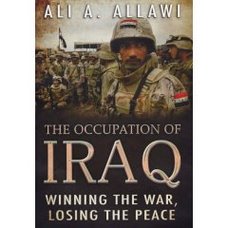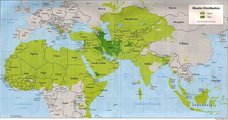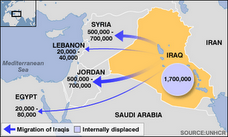"The current Iraq strategy is exactly what Al Qaeda wants—the United States distracted and pinned down by Iraq’s internal conflicts and trapped in a quagmire that has become the perfect rallying cry and recruitment tool for Al Qaeda," according to a new report released Monday by the Center for American Progress.
The report's authors, Brian Katulis, Lawrence J. Korb, and Peter Juul, warn that, "The fundamental premise of Bush’s surge strategy—that Iraq’s leaders will make key decisions to advance their country’s political transition and national reconciliation—is at best misguided and clearly unworkable. Neither U.S. troops in and around Baghdad nor diplomats in the Green Zone can force Iraqi leaders to hold their country together."
The most radical suggestion of the report concerns a recommendation that the US cease arming and training Iraqi security forces--at least until Maliki's government has reached consensus on outstanding political matters.
The Iraqi security forces have been plagued by the infiltration of militia groups, and implicated in sectarian violence, leading the report to conclude:
Spending billions to arm Iraq’s security forces without political consensus among Iraq’s leaders carries significant risks—the largest of which is arming faction-ridden national Iraqi units before a unified national government exists that these armed forces will loyally support. Training and equipping Iraqi security forces risks making Iraq’s civil war even bloodier and more vicious than it already is today. It also increases the dangers that these weapons will one day be turned against the United States and its allies in the region.
Rather than relying solely on the central government, the US initiative should "build on the efforts of the Bush administration to put more emphasis on provincial and local leadership."
Also see: http://www.crisisgroup.org/home/index.cfm?id=4914&l=1 INTERNATIONAL CRISIS GROUP REPORT which describes mismanagement of Basra militarily and says that Iraq is a failed state:
....What progress has occurred cannot conceal the most glaring failing of all: the inability to establish a legitimate and functioning provincial apparatus capable of redistributing resources, imposing respect for the rule of law and ensuring a peaceful transition at the local level. Basra’s political arena remains in the hands of actors engaged in bloody competition for resources, undermining what is left of governorate institutions and coercively enforcing their rule. The local population has no choice but to seek protection from one of the dominant camps. Periods of stability do not reflect greater governing authority so much as they do a momentary – and fragile – balance of interests or of terror between rival militias. Inevitably, conflicts re-emerge and even apparently minor incidents can set off a cycle of retaliatory violence. A political process designed to pacify competition and ensure the non-violent allocation of goods and power has become a source of intense and often brutal struggle.
Basra is a case study of Iraq’s multiple and multiplying forms of violence. These often have little to do with sectarianism or anti-occupation resistance. Instead, they involve the systematic misuse of official institutions, political assassinations, tribal vendettas, neighbourhood vigilantism and enforcement of social mores, together with the rise of criminal mafias that increasingly intermingle with political actors. Should other causes of strife – sectarian violence and the fight against coalition forces – recede, the concern must still be that Basra's fate will be replicated throughout the country on a larger, more chaotic and more dangerous scale. The lessons are clear. Iraq’s violence is multifaceted, and sectarianism is only one of its sources. It follows that the country’s division along supposedly inherent and homogenous confessional and ethnic lines is not an answer. It follows, too, that rebuilding the state, tackling militias and imposing the rule of law cannot be done without confronting the parties that currently dominate the political process and forging a new and far more inclusive political compact.
Iraq is in the midst of a civil war. But before and beyond that, Iraq has become a failed state – a country whose institutions and, with them, any semblance of national cohesion, have been obliterated. That is what has made the violence – all the violence: sectarian, anti-coalition, political, criminal and otherwise – both possible and, for many, necessary. Resolving the confrontation between Sunni Arabs, Shiites and Kurds is one priority. But rebuilding a functioning and legitimate state is another – no less urgent, no less important and no less daunting.
Sunday, July 1, 2007
Subscribe to:
Post Comments (Atom)





No comments:
Post a Comment